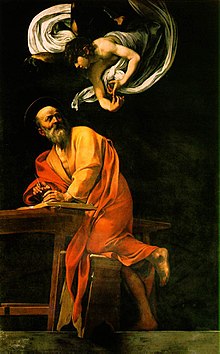Evangelist Matthew
| Matthew the Apostle | |
|---|---|

|
|
| Personal details | |
| Birth name | Levi |
| Died | near Hierapolis or Ethiopia, relics in Salerno, Italy |
| Residence | Capernaum |
| Parents | Alphaeus (father) |
| Saint Matthew the Apostle | |
|---|---|
| Apostle, Evangelist, Martyr | |
| Venerated in |
Eastern Orthodox Church Lutheran Church Oriental Orthodoxy Protestant Churches Roman Catholic Church Anglicanism |
| Major shrine | Salerno, Italy |
| Feast | 21 September (Western Christianity) 22nd October (Coptic Orthodox) 16 November (Eastern Christianity) |
| Attributes | Angel |
| Patronage | Accountants; Salerno, Italy; bankers; tax collectors; perfumers; civil servants |
Matthew the Apostle (Hebrew: מַתִּתְיָהוּ Mattityahu or מתי Mattay, "Gift of YHVH"; Greek: Ματθαῖος Matthaios; also known as Saint Matthew and as Levi) was, according to the Christian Bible, one of the twelve apostles of Jesus and, according to Christian tradition, one of the four Evangelists.
Among the early followers and apostles of Jesus, Matthew is mentioned in and as a publican who, while sitting at the "receipt of custom" in Capernaum, was called to follow Jesus. Matthew may have collected taxes from the Hebrew people for Herod Antipas. Matthew is also listed among the twelve, but without identification of his background, in , and . In passages parallel to Matthew 9:9, both and describe Jesus' calling of the tax collector Levi, the son of Alphaeus, but Mark and Luke never explicitly equate this Levi with the Matthew named as one of the twelve apostles.
Matthew was a 1st-century Galilean (presumably born in Galilee, which was not part of Judea or the Roman Iudaea province), the son of Alpheus. As a tax collector he would have been literate in Aramaic and Greek. His fellow Jews would have despised him for what was seen as collaborating with the Roman occupation force.
After his call, Matthew invited Jesus home for a feast. On seeing this, the Scribes and the Pharisees criticized Jesus for eating with tax collectors and sinners. This prompted Jesus to answer, "I came not to call the righteous, but sinners to repentance." (, )
...
Wikipedia
